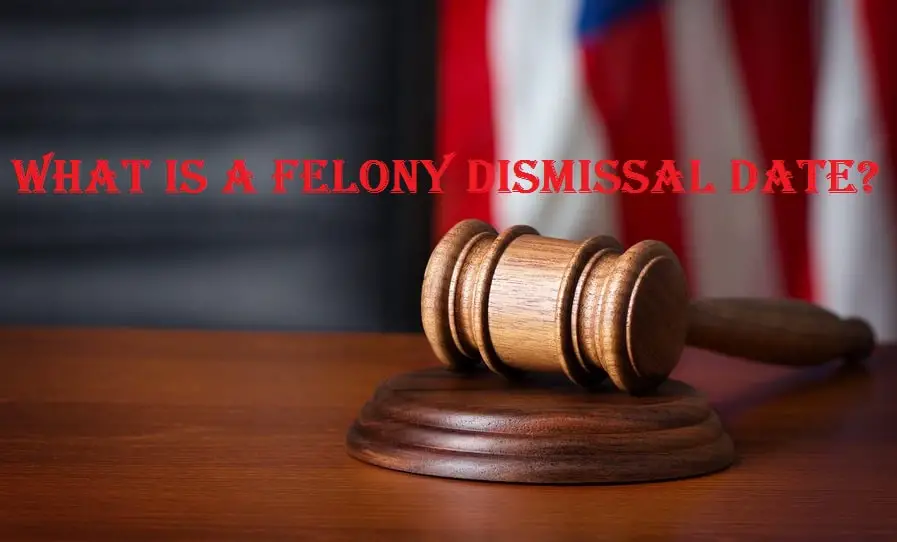Legal processes come with certain requirements that must be followed – right from the first step.
First, the prosecutor presents an indictment – a document that contains charges – in court.
Following a felony indictment, some critical dates must be honored during the prosecution period. Failure of the prosecutor to adhere strictly to these legal dates may lead to a premature felony dismissal.
This article explains the felony dismissal process and some important dates that characterize the duration.
What is a Felony Dismissal Date?

A felony dismissal date refers to the deadline given to the persecutor to file necessary paperwork – chiefly indictment – in the Circuit Court.
Failure to file the required documentation within the stipulated time frame may lead to dismissal of the case by the District Court.
The Felony Dismissal Process
After the prosecutor submits an indictment in court, the trial judge reads out all charges against the defendant. By this, the accused is assumed officially aware of their alleged offenses and may, then, retain legal representation to plead his/her case.
If a preliminary hearing is requested, the court fixes one which must hold on or before ten court days following the felony arraignment.
The purpose of a preliminary hearing is to review the facts and evidence critically. Cases deemed ‘weak,’ after due assessments may not scale through this process, but rather be dismissed right away.
The prosecutor at this hearing must present enough evidence that considerably ties the defendant to the alleged crime. However, at this stage, the evidence may not be at a beyond-a-reasonable-doubt-standard.
If the case scales through the first arraignment, the trial court fixes a date for another appearance. This second arrangement is referred to as Arraignment on Information.
At this hearing, the defendant’s legal representative receives an opportunity to file motions and ask for more detailed discovery of evidence.
The court then orders the defendant to be arraigned on evidence, not later than 15 days after the preliminary hearing.
Typically, the court holds a pre-trial conference before the actual court trial. This conference provides an avenue for the parties to a case to meet before a trial. This ‘forum’ is usually presided over by a trial judge, magistrate, or any judicial officer with less judicial powers than that of a judge.
During the conference, the defendant may make attempts to make a settlement and dismiss the case. A pre-trial conference holds between 30 to 45 days after the second arraignment.
Where attempts to get a settlement fails, the presiding judge fixes the trial.
The duration between the pre-trial conference and a trial largely depends on the nature of the case, discovery time, and time needed for the defense attorney and prosecutor to prepare their cases.
Recommended: How Long Does It Take To Get A Court Date For A Felony?
Requesting a Felony Dismissal
The parties must adhere strictly to the legal process and dates, as outlined by the court. The prosecutor is expected to stick to the time limit in preparing their case.
Where the prosecutor misses stipulated timeframes, mainly as it concerns the presentation of formal charges – the defense attorney may request charges dismissal.
The constitution’s Sixth Amendment offers a defendant the right to a speedy trial.
One important thing is a decision to or not to file less severe charges, in the form of a misdemeanor. It may not also be a simple case of a felony vs. no charges.
The judge may, however, strike out the felony dismissal request and ask that the trial continues if the prosecutor seems to have a strong case.
Felony dismissed with Prejudice vs. Felony Dismissed Without Prejudice

It is widely thought that a felony dismissal means the end of the case – not entirely so in practice.
The primary determinant is whether the dismissal is with or without prejudice.
Cases dismissed with prejudice cannot be refiled in the future.
Felony dismissed with prejudice implies government misconduct or arbitrary legal step that shows a display of bias, preventing the defendant to rights of a fair trial.
Cases may be, however, dismissed without prejudice when it lacks enough evidence for the trial.
Dismissal with prejudice cases grants defendants a sense of freedom to continue with their normal lives without worries since the case cannot be refiled in the future.
Conversely, dismissal without prejudice offers a prosecutor an opportunity to revisit the case in the future, when enough evidence is available for trial.
Would a dismissed case remain on my records?
Yes. There’s a widespread belief that dismissed criminal charges are automatically erased from an offender’s record – wrong!
Fact is, an arrest stays on one’s record, pending when a court grants an expungement petition.
After a successful expungement, the court then sends an order to all concerned agencies and interested parties, prompting them to destroy all records of criminal arrest and prosecution.
However, after a felony dismissal, the prospective petitioner must satisfy the waiting period – based on the offense – before applying for expunction.
The waiting period is usually a minimum of three years for felonies and two years for misdemeanors.
A trial is undoubtedly riskier than a plea bargain or a dismissal. However, when acquitted at trial, expunction eligibility is immediate, unlike the 3-year compulsory wait after a dismissal.
Will a defense attorney increase the chances of getting a dismissal?
Of course, as with most legal proceedings, a professional legal aid on your team will not only help navigate seamlessly through the process, it increases your chances of a desired outcome.
For dismissal, a seasoned defense attorney takes extra efforts to investigate your case and uses his professionalism to persuade the prosecutor to strike out the case.
Also, the case may have hidden facts that counter the state’s claims and available evidence that can only be spotted by a legal expert. They may also make the court somewhat sympathize with you and offer you another chance.
Do well to search for an attorney to help improve your odds of a good outcome.
Supporting An Accused After a Dismissal
If you have a friend or family who is just a felony dismissal, they need you now than ever. Remember, they are not done with the legal battle yet.
Part of their preparation for the ‘next lap’ involves keeping in touch with their lawyers and sustaining a good rapport with the legal counsel.
Also, the accused needs encouragement to maintain a healthy lifestyle, increase their productivity, and avoid any legal issues.
Encouragement from loved ones and family will go a long way during this period and process. They need to be encouraged to be hopeful in anticipation of future prosecution.
